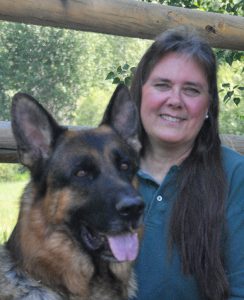BY FRAN JEWELL

Last week I shared an article describing how a dog feels going to the dog park, with the hopes of helping dog owners to understand the dog’s point of view.
What I did not focus on is how what happens to our dogs, that we love enormously, affects our relationships and us as human beings. As a dog behavior consultant, this topic brings up too many issues far beyond obedience.
Literally, there isn’t a day that goes by that someone does not share with me how their dog was attacked by another dog and their dog has now become fear aggressive and does not enjoy other dogs. I am asked to fix this canine PTSD [post-traumatic stress disorder]. As with humans, PTSD is not something that is easily fixed. It can ruin the happiness of a dog and its family. Dog owners whose dogs have been attacked no longer feel that they can take their dog on wonderful hikes for fear of meeting another dog that will once again attack.
The trauma of watching your dog being mauled, injured, and brutalized by an aggressive dog not only terrorizes the dog, but also terrorizes the owner that relives that moment over and over. Some owners are injured during the fight trying to break up the dogs. There are some dogs that will not let go. The owner of the victim dog tries desperately to pry open the mouth of the attacking dog. Many times the owner of the attacking dog is not to be found, or busy chatting with a friend, or even on their cellphone, without any idea what is happening.
I had a dog attack my oldest German shepherd, Brinx, on Leadville Avenue in Ketchum. My dog was on a leash with me, and the offending dog was off-leash. When I asked the owner to call her dog, she did nothing. She just stood there watching. The offending dog bit Brinx four times. I was fortunate in that Brinx had a huge winter coat so he had no puncture wounds. He was much larger than the offender and could have, if I had allowed him to defend himself, done huge damage to the other dog. Fortunately, Brinx trusted me to keep him safe, and did what I told him to, which was “Leave it.” Later, I understood the woman was bragging in public how her dog attacked my dog. Really?
I am astonished that any caring human, especially a dog-loving human, could be so uncaring about other people and other dogs that they would allow their dog to perform such acts of aggression. Is this really the kind of dog owner anyone would want to be? Do we want to be the kind of community that doesn’t care about the emotional scars dog aggression causes?
You see, it is not just about how the dog that was attacked suffers PTSD for a very long time or forever, it is also about the PTSD and emotional scars the owner experiences from these attacks.
The answer is not simple. However, there are important things all dog owners should do. Be proactive and train your dog to have a rock-solid recall. If your dog has aggressive tendencies, be aware and don’t put your dog in a position where he can aggress another dog or human. That means, do not take your dog to public places off leash! You might muzzle train your dog, too. When you walk with your dog, you should be there for your dog, not your cellphone. Control your dog until you ask another dog owner if they can play. Do not assume that your dog will always play nicely without supervision. It is much like taking children to a park. You wouldn’t just take a child to a park, then not watch them and how they interact with other children. We must constantly teach our dogs, just like children, what nice play is and what it is not. A well-trained dog will return to its owner even in the face of a distraction.
Please, think about other people with kindness and how a dogfight can affect them. Let’s build a better place to live for our dogs and ourselves.
Fran Jewell is an Idaho Press Club award-winning columnist, IAABC-certified dog behavior consultant, NADOI-certified instructor #1096 and the owner of Positive Puppy Dog Training, LLC, in Sun Valley. For more information, visit positivepuppy.com or call (208) 578-1565.
